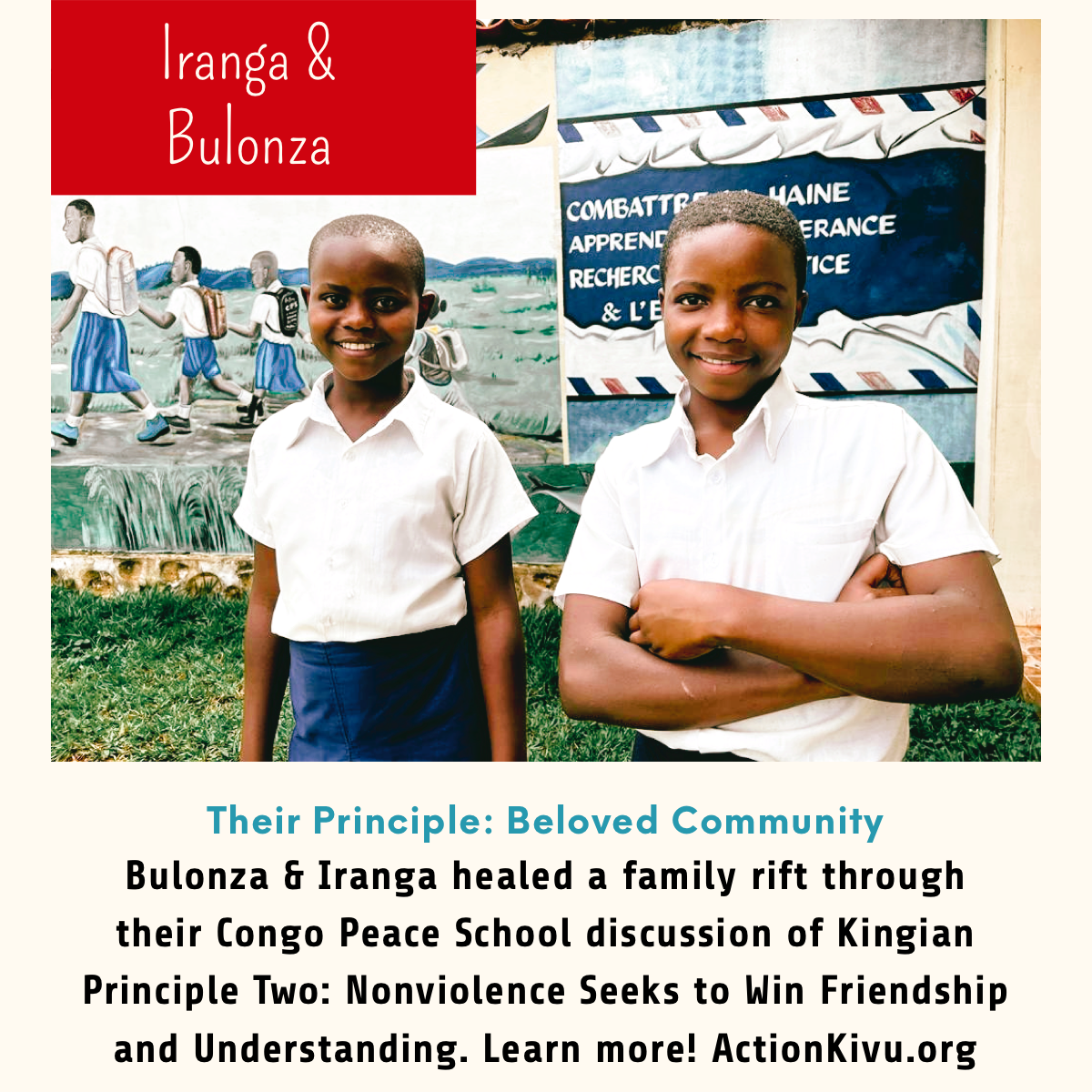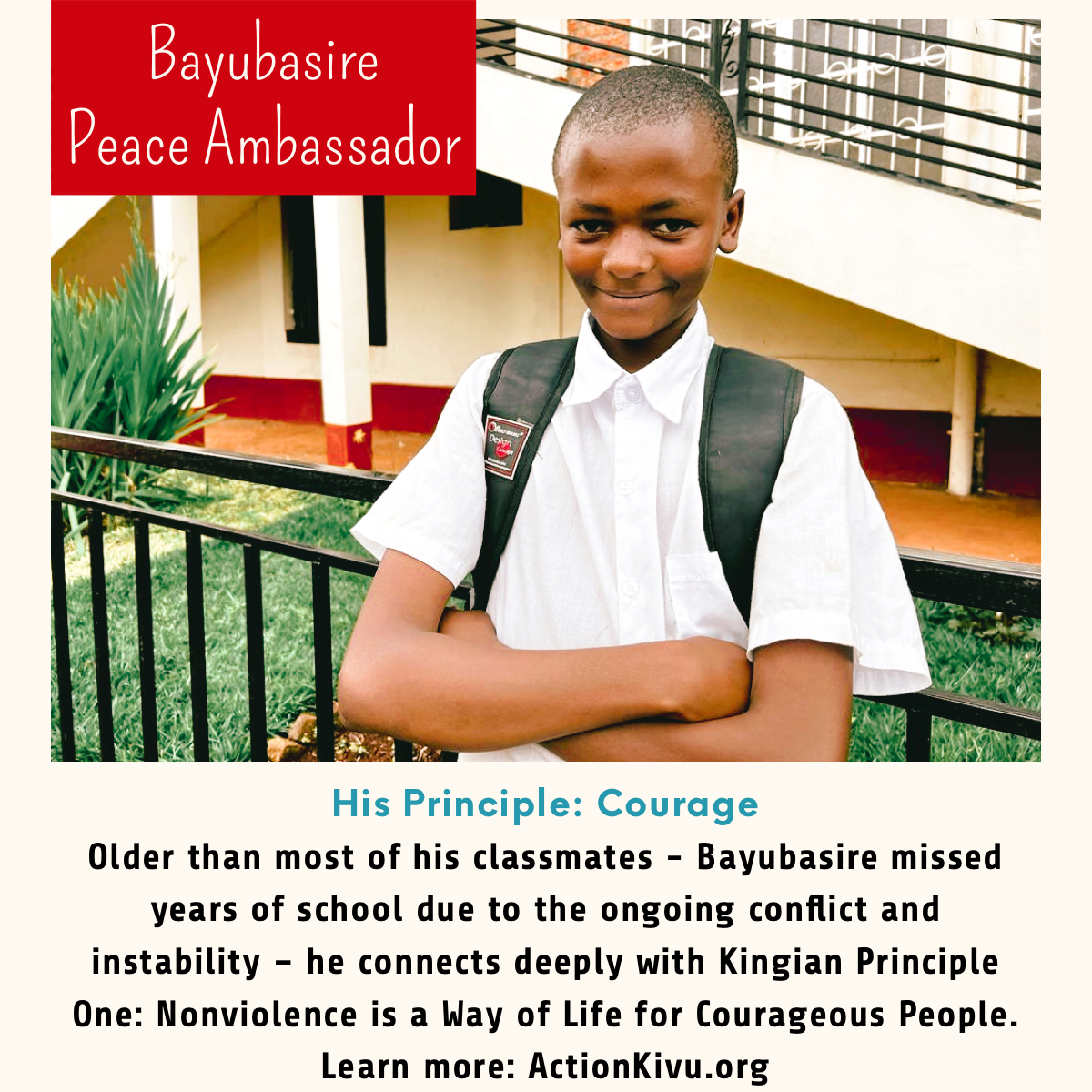This past summer the Congo Peace School offered an art course, taught by volunteers from a university in nearby Bukavu. Before this unique course – a rarity in a region where many of the children’s families can’t afford a pencil and paper, let alone paints – we asked four of the students to define what art means to them. And now we follow-up with them, after they have completed the course.
Before: 6th grader Ambika had said, “Drawing, painting, and that’s it.” Ambika signed up for the art class to learn more, to discover new things.
After: “I had no idea children of our ages could learn and achieve what we achieved during the art class. When we started learning how to draw using a pencil, I had no idea we were to do more. When we started shredding the papers I was a little bit disappointed but when we started making dough from waste paper, it gave me hope, but I could not have imagined we would be able to achieve making a flamingo. The day we made it, I loved art more and more and can't wait to be in another summer class and learn how to achieve more. Now I know that art is everything, it's more than drawing and painting: art is an expression and can be used in many ways.” – Ambika
Before: Fellow 6th grader Mushagalusa had said, “I think art is just drawing and I very much like to draw. I signed up for the art class because I am curious and want to learn. This is exceptional, no other school has a formal art class, I am lucky and happy to be a student at the Congo Peace School. There is no other way I make art apart from drawing at school but nobody teaches you, you have to do it on your own.”
After: “After our summer art class, now I know that art is not only about drawing at school, but also more than that. It's a very complex area, it's many things at a time, someone can communicate and speak through art, and it can be used to express or demand peace. I am very proud to have achieved this dove as a symbol of peace that our country is hungry for.” – Mushagalusa
Before: 4th grader Nsimire had simply said, “I had never heard about art before. I want to learn and discover. I like colors.”
After: ''I discovered art and I like it, now I know that it's a combination of many things coming together to achieve one thing like the fish we were able to achieve as a group. I am very curious to learn more next summer.'' – Nsimire
Before: Agisha had defined art as “using pencil and color crayons to draw or paint or write like on the walls of our school.* But I didn’t know children like us can do art. I signed up for this class to learn art.” (*The school has murals and quotes around the campus.)
After: ''It is very amazing, it makes me happy to see children like us being a part of this process. From simple pencil drawing to cutting paper, then putting them together and making the ‘dough,’ mixing it with paint and then come up with a lamp! I had only been seeing these things in books here at our school. I am very excited about achieving more during the next summer art program. Why is there no art class in the school curriculum?'' – Agisha
You are part of this joy-inducing, life-giving community! A big thank you to everyone who gives monthly or annually to support this unique school that is creating equality and peace from the inside out.
Currently the Congo Peace School’s powerful curriculum rooted in peace and nonviolence is funded by our community of donors and foundation grants to the level that we often employ art as therapy, but we want to change the answer to Agisha’s last question and sustainably expand the offerings, including art and other vocational trainings. Please share these stories with friends and family to help us grow our community of support.
⚪ As the new school year kicked off in September, the Congo Peace School celebrated the graduation of Grade 6 students into Grade 7 (or 1st grade secondary, as it is known in DRC). This ceremony was the first of its kind in Mumosho, and rare in South Kivu and Eastern Congo. The gowns were made by many of the graduates of Action Kivu’s Sewing Workshop – just one illustration of how our programs build upon and support each other.
Family and community members gathered to celebrate the special day. Please watch the video with the volume up to celebrate with these students who all passed the nationwide standardized test to graduate into secondary school!
The sense of self-worth this helps provide is priceless. Thank you for investing in the lives of so many in this way.
⚪ The Nest is the preschool at the Congo Peace School – three classrooms supported by our partner PILA Global in fostering curiosity and a sense of agency in the students ages 4 to 6 years old, preparing them for elementary school where they are encouraged to question and think critically, unlike so many schools in the region.
Amani shared the following video with the notes: Marcelin Murhula is a 5-year-old Congo Nest student who demonstrates remarkable oral communication skills, initiative-taking, sharing his thoughts, and thinking critically.
In the video, Marcelin is speaking correct French (the official language of education in DRC, and the third language citizens learn, after a local dialect and Swahili). Here he is talking about his school, saying: ''our school is called Congo Peace School. It’s beautiful, it has three levels: preschool, elementary, and secondary. We have amazing caregivers and teachers, they teach us reading, writing, and numeracy. May Congo Peace School live long!”
⚪ Lastly, we just finished a new video that highlights so much of what is special about the Congo Peace School – please watch and share!
With gratitude for your continued partnership and drive to create a more equitable, just, and peace-filled world.














































